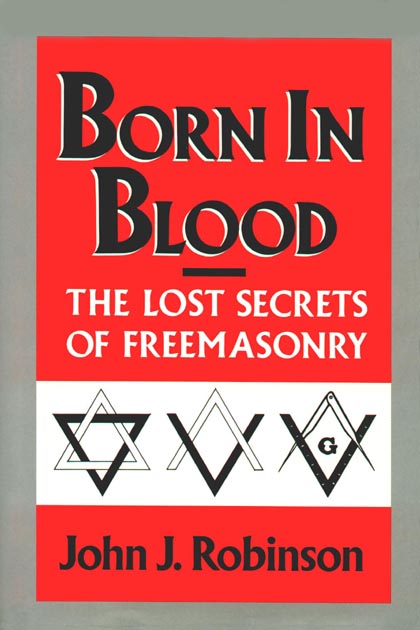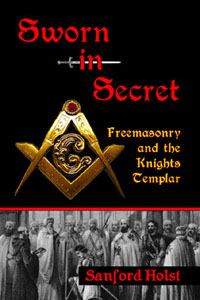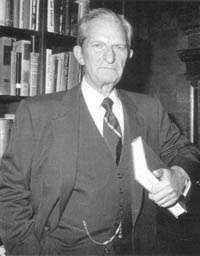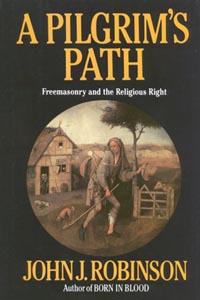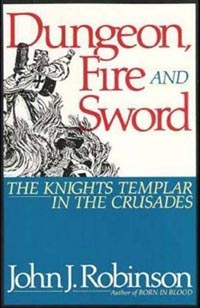|
born in blood, book review |
||
|
|
||
|
|
Born In Blood The Lost Secrets of Freemasonry by John J. Robinson Book Review While John Robinson was studying a curious event known as the English Peasants' Revolt of 1381, he came across intriguing clues that seemed to link this event to the society of Knights Templar which had been disbanded 69 years earlier. Participants in the revolt revealed that a secretive Great Society was behind the uprising, and aspects of that clandestine group resembled the society of Freemasons which would emerge from secrecy many years later. This connection was not one he had expected to find, for Robinson was not a Mason at that time, and had no reason to seek or create Masonic history. He simply reported what he found. There would be no point in trying to repeat here all the many clues he discovered. It took 376 pages to do it in the book, and could not be done justice in so short a space. But to give one clear example, he traced many Masonic words, symbols and customs to the practices and language of the Templars. They spoke Medieval French at that time, as did the upper class in England--a lingering reminder of the Norman Conquest and its accompanying French nobility. With that realization, some things that had not made sense before began to fall into place. The person who guards the door in Masonry is called a tyler. Many have made the asumption that -- if Freemasons were connected to stonemasons -- then perhaps this was referring to the related craft of tilers who put tiles on top of buildings as a form of roofing. Yet this officer stands at the door of the lodge and not on the roof, so that "tiler" does not fit. In Medieval French, however, the word that sounds identical to "tyler" is "tailleur," and it means one who cuts. The English word "tailor" comes from this, and means the one who cuts cloth. Does that fit? Among the Knights Templar, the secrecy of their meetings was preserved by having a knight stand at the door with a drawn sword to keep any evesdroppers away. The Masonic tyler wears the symbol of a sword as his badge of office. He is the one who stands at the door and cuts if necessary. Among Medieval-French-speaking Templars, he was the tailleur. Among Masons,he same word became written as tyler. The duties and marks of office remained the same. If that was the only thing Robinson found, we could shrug and move on. But when it became dozens and dozens of connections, it's harder to do that. To be honest, what he does not do is explain how Templars became Masons. So while his work is highly suggestive, at the end of the day it is not compelling. He opened the door, but did not walk through. Still, a peek into a hidden room is of some value, and many have found this to be fascinating. Robinson's work was continued and taken to the lext level in Sworn in Secret, written in 2012 by a historian and Master of a Masonic Research Lodge. Born In Blood Sworn in Secret Book Reviews “Thought-provoking,
well researched and well written, the book presents information rather
than strongly arguing for a point of view. In doing so, Holst builds a
persuasive case. He has collected a great deal of information from
numerous sources and provides a fine overview of events which forever
changed the world.” --
Scottish Rite Journal "A
well-written and nicely illustrated book, easy to read, well researched,
and highly recommended." -- Knight
Templar Magazine ________________________________________________________ Rare Masonic books, Civil War, Best Masonic books, Masonic directory, Masons Templars, Masonic research Masonic authors, Civil War2, Templar medals, Table Lodge Buffalo Bill Cody, Quarry Project, Old Time Freemasonry Sworn in Secret, Early American, Knights Templar, Civil War3 Latest books, Born in Blood, Solomon's Temple, Coil's Encyclopedia York Rite, Allen Roberts, John Robinson, 2010 symposium, Allen Price Grand Lodge England, Holy Grail, Kabbalah, Nadia, Robert Burns Masonic education, UCLA, Stonemasons, Scottish Lodge US Lodges, UK Lodges, Canada Lodges, Australia Lodges Templar Swords, Freemason, Templar Trials, Templars Vatican Origin of Freemasonry, Templar history, Freemasons history © 2008-2024 Sanford Holst - web design by webwizards |
Born In Blood
John J. Robinson (c.1918-1996) Book Review
Born In Blood
|







